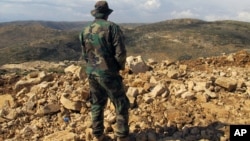Hezbollah fighters have recently increased in numbers on the front lines in northern Syria, aiding the military of President Bashar al-Assad against rebel forces and Islamic State militants, analysts tell VOA.
The presence of the Lebanon-based Hezbollah has grown noticeably in Syria since Russia began its air campaign in late September in support of the Assad government. Hezbollah casualty figures in October show a steady increase in battle deaths.
“The national, ethical and humanitarian duty requires us to fight Daesh [IS] outside [Lebanon] borders, not inside them,” Nabil Qaouk, deputy head of Hezbollah’s executive council, told the official Lebanese National News Agency on Monday.
In the ongoing battle for Aleppo, Syria’s largest city, Tehran-backed Hezbollah fighters have reportedly taken a key role alongside Iranian forces in support of the Syrian regime.
“Hezbollah is preoccupied in other battles as well, including [in] northern Hama and a smaller involvement in Quneitra,” said Nadav Pollak, an analyst at the Washington Institute for Near East Policy.
Since the beginning of the crisis in Syria, Hezbollah has been not been very open about the scale of its involvement, but its leader, Hassan Nasrallah, has occasionally referred to siding with the Syrian government as a strategic need and a religious duty.
Syrian opposition groups say the Lebanese group uses the presence of IS militants as a pretext to continue involvement in Syria’s civil war.
“Hezbollah is a terrorist organization. They cannot be a legitimate force,” Colonel Riyad al-Asaad, founder of the rebel group Free Syrian Army, told VOA.
Hezbollah and other Iraqi and Iranian Shi'ite militias under the direct command of the Iranian Revolutionary Guard Corps in southern Aleppo and northern Hama are fighting opposition groups, he said. “The [Syrian] regime forces have no command role on these fronts,” he said.
Experts estimate the number of Hezbollah fighters in Syria at 6,000, many of whom are concentrated in Damascus and Homs, with smaller numbers in Aleppo and Hama provinces.
The Britain-based Syrian Observatory for Human Rights says Hezbollah has lost nearly 900 fighters during the war in Syria.
Hezbollah rarely comments on its Syrian operations. Nawaf al-Moussawi, a pro-Hezbollah member of the Lebanese parliament, declined to talk to VOA, saying the group does not discuss details of its involvement in Syria’s war.
Two views in Moscow
The unofficial military alliance among Iran, Hezbollah and Russia has some sticking points.
Moscow fears that Hezbollah’s extreme sectarian motives could endanger Russian strategy in propping up the Assad regime, analysts say, but Russia also believes that Hezbollah is one of the most effective forces fighting alongside Syrian government troops.
Iran, Hezbollah’s primary backer, believes the group, along with other Shi'ite militias, is essential in gaining momentum in the fight against Sunni opposition rebels in Syria.
The semiofficial Iranian Mehr News Agency reported that in a recent speech at Tehran University, General Mohammad Ali Jaafari, commander of the elite Iranian Revolutionary Guard, told students that “Russia is helping in Syria but is not happy with the Islamic resistance [Hezbollah]." Nonetheless, the general was quoted as saying, Russia "provides assistance based on mutual interest.”
After nearly four years of direct combat in Syria, Hezbollah militants have shown signs of battle fatigue on many fronts, especially in areas of continuing confrontations with rebel groups in Homs and the Qalamoun region of Damascus.
“Hezbollah fighters are somewhat exhausted after the long battle in al-Zabadani [in Damascus] and elsewhere." This shows that "they have their limitations in Syria,” analyst Pollak said.
Hezbollah’s longtime adversary, Israel, has been cautiously monitoring developments in Syria. While the Israeli government has remained largely neutral to Syria’s civil war, experts believe Hezbollah’s involvement in Syria could go both ways for Israel.
“On one hand, it is beneficial for Israel if Hezbollah risks and loses its best personnel fighting in an unrelated conflict,” said Israeli journalist Roei Eisenberg. “But on the other, the group has amassed a lot of experience [in fighting in a major war].”
Since the 2006 Israeli-Hezbollah war, the two sides have occasionally exchanged attacks. In the wake of the Syrian uprising, Israel has also hit Hezbollah targets inside Syria. The latest one took place last week in the Qalamoun region.
“[Israel] strikes [against Hezbollah in Syria] are conducted to avert arms shipments. The message [is]: Keep the post-2006 status quo,” Eisenberg said.




